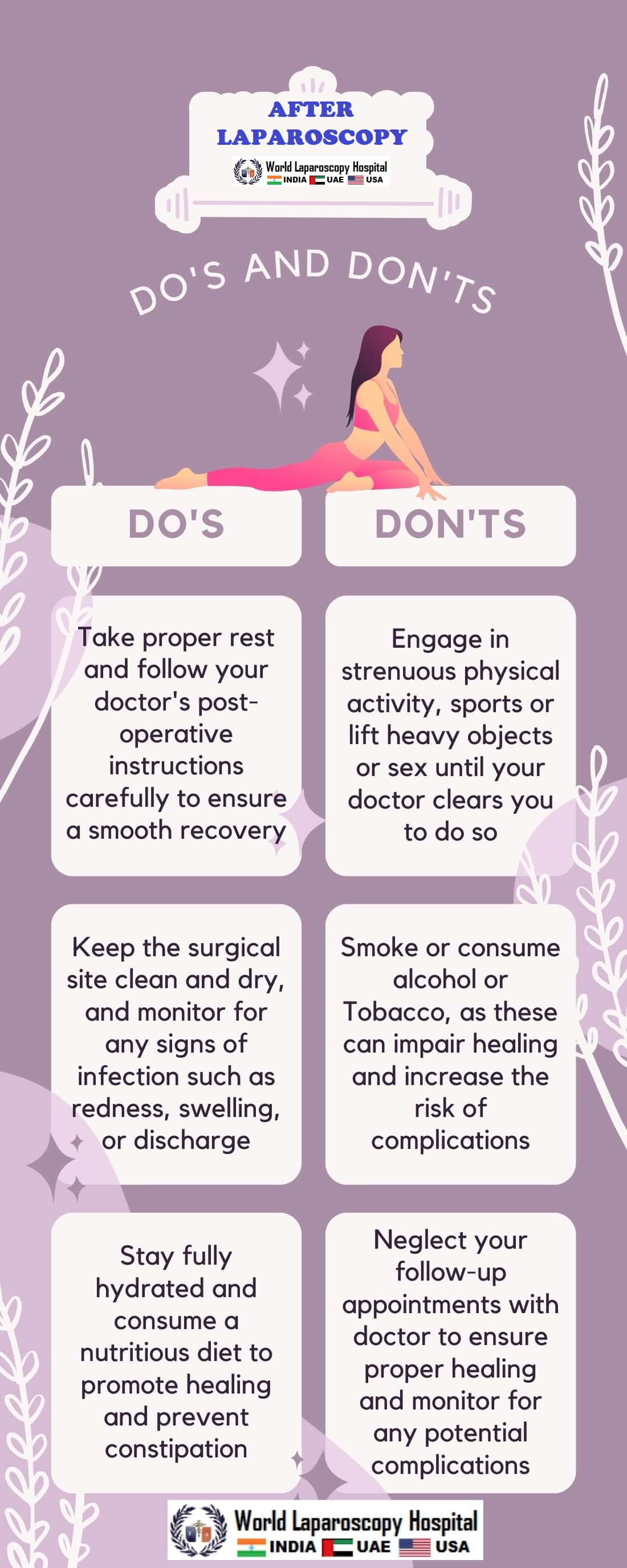
Do's
- Take proper rest and follow your doctor's post-operative instructions carefully to ensure a smooth recovery.
- Keep the surgical site clean and dry, and monitor for any signs of infection such as redness, swelling, or discharge.
- Stay hydrated and consume a nutritious diet to promote healing and prevent constipation.
Don't:
- Engage in strenuous physical activity or lift heavy objects until your doctor clears you to do so.
- Smoke or consume alcohol, as these can impair healing and increase the risk of complications.
- Neglect your follow-up appointments with your doctor to ensure proper healing and monitor for any potential complications.
However, despite the many benefits of laparoscopic surgery, patients must still take certain precautions to ensure a successful recovery. In this essay, we will discuss the do's and don'ts that patients should follow after laparoscopic surgery.
Do's After Laparoscopic Surgery
Follow Your Doctor's Instructions
After laparoscopic surgery, your doctor will provide you with detailed instructions on how to care for yourself at home. It is crucial that you follow these instructions closely to ensure a smooth recovery. Your doctor may provide you with instructions on when to change your dressings, how to care for your incision sites, and when to resume normal activities.
Take It Easy
While laparoscopic surgery is less invasive than traditional open surgery, it is still a surgical procedure that can take a toll on your body. It is essential that you take it easy after your surgery to give your body the time it needs to heal. Your doctor will likely recommend that you take at least a few days off from work and avoid any strenuous activities until you are fully healed.
Stay Hydrated
Drinking plenty of fluids is crucial after laparoscopic surgery. Staying hydrated can help prevent constipation, which is a common side effect of pain medication and reduced physical activity. Drinking water, electrolyte drinks, and clear broths are good options for staying hydrated after surgery.
Gradually Increase Physical Activity
While you should avoid strenuous activity immediately after laparoscopic surgery, it is essential to gradually increase your physical activity as your body heals. Walking is a great way to start, as it can help prevent blood clots and promote healing. Your doctor may also recommend specific exercises to help you regain strength and mobility.
Eat Nutritious Foods
Eating a nutritious diet can help promote healing after laparoscopic surgery. Focus on eating foods that are rich in protein, such as lean meats, fish, and eggs, as well as fruits, vegetables, and whole grains. Avoid foods that are high in fat, sugar, or salt, as they can slow down healing and increase the risk of complications.
Keep the Incision Sites Clean and Dry
Keeping the incision sites clean and dry is crucial after laparoscopic surgery to prevent infection. Your doctor will provide you with instructions on how to care for your incision sites, including how often to change your dressings and how to clean the incision areas.
Don'ts After Laparoscopic Surgery
Lift Heavy Objects
Lifting heavy objects after laparoscopic surgery can put undue strain on your incision sites and slow down the healing process. Your doctor will likely recommend that you avoid lifting anything heavier than 10 pounds for at least a few weeks after surgery.
Smoke or Use Tobacco Products
Smoking and using tobacco products can slow down the healing process after laparoscopic surgery and increase the risk of complications. Nicotine can constrict blood vessels and reduce the amount of oxygen that reaches the tissues, which can slow down healing and increase the risk of infection.
Neglect Follow-Up Appointments
Follow-up appointments with your doctor are crucial after laparoscopic surgery to ensure that you are healing properly and to monitor for any potential complications. It is essential that you attend all of your scheduled appointments and inform your doctor of any symptoms or issues that you may be experiencing.
Consuming alcohol or other substances after laparoscopic surgery can slow down healing and increase the risk of complications. Alcohol can interfere with the healing process and increase the risk of bleeding and infection, while other substances can interfere with medications or cause adverse reactions.
Overexert Yourself
Overexerting yourself after laparoscopic surgery can lead to complications and slow down the healing process. It is essential to follow your doctor's recommendations on when to resume normal activities and gradually increase your physical activity.
Ignore Signs of Infection or Complications
Ignoring signs of infection or other complications after laparoscopic surgery can lead to serious health problems. It is essential to monitor your body for any signs of infection, such as redness, swelling, or discharge from the incision sites, as well as other symptoms such as fever, chills, or pain. If you experience any of these symptoms, it is important to contact your doctor right away.
Conclusion
Laparoscopic surgery is a minimally invasive surgical technique that offers many benefits over traditional open surgery. However, patients must still take certain precautions to ensure a successful recovery. Following your doctor's instructions, taking it easy, staying hydrated, gradually increasing physical activity, eating a nutritious diet, and keeping incision sites clean and dry are all important do's after laparoscopic surgery. Lifting heavy objects, smoking or using tobacco products, neglecting follow-up appointments, consuming alcohol or other substances, overexerting yourself, and ignoring signs of infection or complications are all important don'ts after laparoscopic surgery. By following these do's and don'ts, you can ensure a smooth and successful recovery after laparoscopic surgery.